Human biosciences Study guides, Revision notes & Summaries
Looking for the best study guides, study notes and summaries about Human biosciences? On this page you'll find 56 study documents about Human biosciences.
All 56 results
Sort by
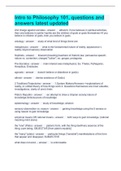
-
Intro to Philosophy 101, questions and answers latest updated
- Exam (elaborations) • 8 pages • 2023
- Available in package deal
-
- £12.30
- + learn more
Intro to Philosophy 101, questions and answers latest updated 2nd charge against socrates atheism; if one believes in spiritual activities, then one believes in spirits->spirits are the children of gods or gods themselves->if you believe in children of gods, then you believe in gods. ontology study of what kind of things there are metaphsyics what is the fundamental nature of reality; appearance v. reality; beyond sensory observation Sophists itinerant (traveling)...
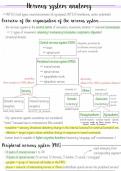
-
NEU 1: Nervous system anatomy
- Lecture notes • 11 pages • 2023
- Available in package deal
-
- £7.99
- + learn more
Lecture notes from Imperial College London, Medical Biosciences BSc, 2nd year, Neuroscience (NEU) module. learning objectives: LO1: Recall the gross organisation of the human central and peripheral nervous systems LO2: Illustrate the structure and functions of the spinal and cranial nerves LO3: Identify the main CNS structures and summarise their functions: spinal cord, brainstem, diencephalon, basal ganglia, cerebral cortex and cerebellum. LO4: Explain the structure and function of: c...

-
NEU 8: Seizures & epilepsy
- Lecture notes • 7 pages • 2023
- Available in package deal
-
- £7.99
- + learn more
Lecture notes from Imperial College London, Medical Biosciences BSc, 2nd year, Neuroscience (NEU) module. Learn what epilepsy is and what steps forward have been made in the management of the condition. Learning outcomes: - Identify the major neurotransmitters in the human nervous system and some of the main receptors. - Describe the etiology and presentation of epilepsy. - Explain the physiological basis of EEG and how it is used to assess seizures. - Analyse the different ty...
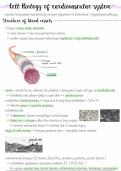
-
CBT 7: Cell biology of the cardiovascular system
- Lecture notes • 7 pages • 2023
- Available in package deal
-
- £7.99
- + learn more
Lecture notes from Imperial College London, Medical Biosciences BSc, 2nd year, cardiovascular and thoracic biology (CTB) module. Lecture 7 on cell biology of the cardiovascular system: how cellular components of the cardiovascular system help maintain vascular homeostasis. Homeostasis is a healthy state that is maintained by the constant adjustment of biochemical and physiological pathways. An example of homeostasis is the maintenance of a constant blood pressure in the human body. lear...
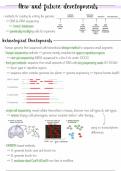
-
GEN 10: New and future developments
- Lecture notes • 6 pages • 2023
- Available in package deal
-
- £7.99
- + learn more
Lecture notes from Imperial College London, Medical Biosciences BSc, 2nd year, genetics and genomics (GEN) module. "In this last session we will review new and emerging methods, such as single cell sequencing and CRISPR-based genome engineering, and see how they are set to transform areas such a gene therapy, personalised medicine, ageing and the use of non-human organisms. We will also touch on the potential risks and ethical issues raised by these developments." learning objectives: ...
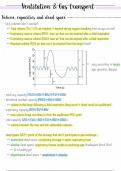
-
CTB 3: Ventilation and gas transport
- Lecture notes • 6 pages • 2023
- Available in package deal
-
- £7.99
- + learn more
Lecture notes from Imperial College London, Medical Biosciences BSc, 2nd year, cardiovascular and thoracic biology (CTB) module. Lecture 3 on ventilation and gas transport: fundamental processes required to achieve effective breathing and gas transport. These processes enable oxygen to get from the atmosphere to the human cells using it for aerobic energy production, and for carbon dioxide (a waste product) to go the other way. Learning objectives: LO1: Differentiate between different f...
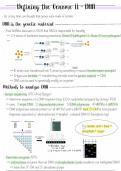
-
GEN 3: Defining the Genome II - DNA
- Lecture notes • 7 pages • 2023
- Available in package deal
-
- £7.99
- + learn more
Lecture notes from Imperial College London, Medical Biosciences BSc, 2nd year, genetics and genomics (GEN) module. Focus on genomic DNA. How do we know it is the DNA that genes are made of? In fact, for a long time it was thought that genes must be made of protein. We'll describe how this idea was disproved. Once it was realised that genes were DNA, techniques for analysing DNA burgeoned and gave rise to modern molecular genetics and genomics. We will review the basic principles of some of t...
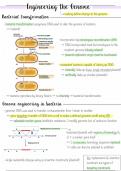
-
GEN 9: Engineering the genome
- Lecture notes • 6 pages • 2023
- Available in package deal
-
- £7.99
- + learn more
Lecture notes from Imperial College London, Medical Biosciences BSc, 2nd year, genetics and genomics (GEN) module. Description of genome engineering methods, particularly in mammals, and the principles underlying them. Nowadays, we can now modify genotypes of most organisms directly, quickly and radically, using a growing array of genome engineering methods. Most of these involve introducing DNA into cells where it integrates into the genome using DNA repair pathways. The latest methods also ...
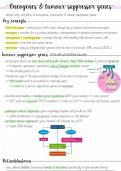
-
CBIO 2: oncogenes and tumour suppressor genes
- Lecture notes • 5 pages • 2023
- Available in package deal
-
- £7.99
- + learn more
Lecture notes from Imperial College London, Medical Biosciences BSc, 2nd year, Cancer Biology (CBIO) module For a cancer to be initiated, certain changes must take place within the genes of a cell. These genes usually control the process of cells growing and reproducing only as required, in an orderly and controlled way (cell proliferation, differentiation, and survival). Studies of tumour viruses revealed that specific genes (called oncogenes) are capable of inducing oncogenic cell changes, ...

-
GEN 4: Comparative Genomics
- Lecture notes • 3 pages • 2023
- Available in package deal
-
- £7.99
- + learn more
Lecture notes from Imperial College London, Medical Biosciences BSc, 2nd year, genetics and genomics (GEN) module. By comparing the sequences of different species we can identify sequences that have been conserved over long periods of evolution and so are likely to have important biological functions. You will also see how the extent of such sequence conservation can be used to measure evolutionary relationships between the species. Similarly, when comparing sequences repeats within a single ...

That summary you just bought made someone very happy. Also get paid weekly? Sell your revision notes on Stuvia! Discover all about earning on Stuvia


